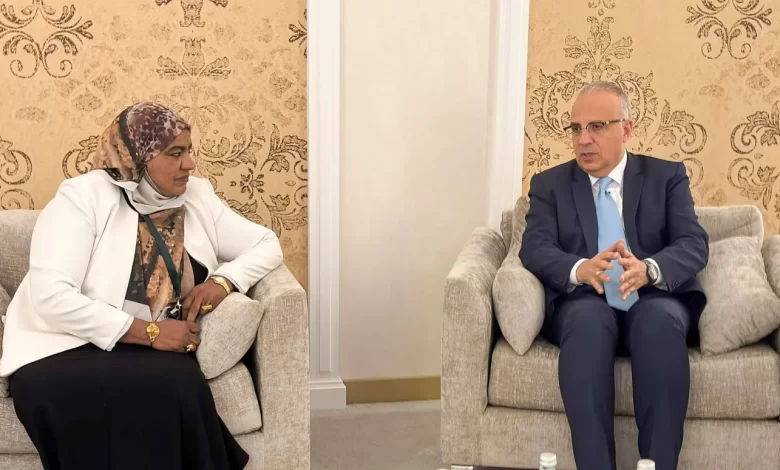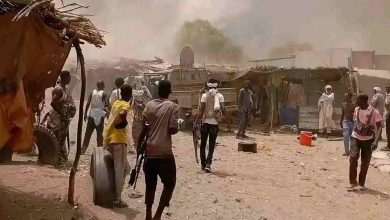Reports
“Grand Ethiopian Renaissance Dam”: Sudan and Egypt Reaffirm Rejection of Any Harm to Their Water Rights

Egypt and Sudan have reiterated their rejection of “any infringement on their water rights from the Nile River” and emphasized the “dangers of constructing the Ethiopian Grand Renaissance Dam without any consultation with the downstream countries.” They also pointed out that Ethiopia’s actions to impose a fait accompli “violate international law principles.”
The Egyptian-Sudanese stance on the water security issue aligns, considering it an “existential matter for both countries.” Former experts and diplomats have emphasized the importance of the united position between Egypt and Sudan regarding the Ethiopian dam, in light of Ethiopia’s disregard for the concerns and demands of the downstream countries.
Since 2011, Ethiopia has been constructing the Grand Ethiopian Renaissance Dam (GERD) on a tributary of the Nile, facing objections from Egypt and Sudan, who are calling for a legally binding agreement to regulate the dam’s filling and operation, ensuring no harm to their water shares. The three countries have engaged in multiple rounds of negotiations over nearly 13 years, without reaching an agreement on the dam’s operational rules.
Egypt’s Minister of Irrigation, Hani Sweilem, met with Sudan’s Secretary-General of the Supreme Council for Environment and Natural Resources, Mona Ali, to discuss the impacts of the Ethiopian dam on the two countries. Both reaffirmed their rejection of “any actions or measures that undermine Egypt and Sudan’s rights to Nile waters or harm the water interests of the two countries,” according to the Egyptian Ministry of Irrigation.
Sweilem criticized Ethiopia’s unilateral actions regarding the dam, saying that “the other party (Ethiopia) only seeks to entrench the status quo, with no political will to reach a solution.” He reiterated the need for countries sharing international rivers to adhere to applicable international law, according to the statement.
Ethiopian Prime Minister Abiy Ahmed announced the “completion of the construction and filling of the dam,” stating in a speech before Ethiopia’s parliament at the end of October that “the completion of the dam will not cause any harm to the downstream countries, Egypt and Sudan.” However, Egypt views the dam as “an existential threat” and, in a letter to the UN Security Council in August, the Egyptian Foreign Ministry stated that “Ethiopian illegal policies will have serious negative impacts on the downstream countries.”
The Egyptian Minister of Irrigation stressed the importance of “effective water cooperation on international river basins,” considering it “an existential matter for Egypt” and pointing to the “dangers of constructing the dam without adequate consultation or studies on safety, or on the economic, social, and environmental impacts on neighboring countries,” which he described as a “violation of international law.”
The Secretary-General of the Sudanese Environmental Council highlighted the negative impacts of the Ethiopian dam on Sudan and called for “cooperation to address the risks of artificial droughts caused by the construction of large dams on rivers,” according to the Egyptian Ministry of Irrigation.
Since Ethiopia announced the construction of the dam in April 2011, Egypt and Sudan have been calling for environmental impact studies. According to international water expert Diaa El-Qousi, “Ethiopia has ignored the Egyptian and Sudanese demands,” noting that “the dam project causes massive environmental impacts on both Ethiopia and the downstream countries and could lead to floods or desertification in Sudan.”
El-Qousi believes that “coordinating the dam’s operational mechanisms among the three countries is essential and necessary to minimize its harm on the downstream countries,” adding that “the dam is built on an international river, and according to international law, decisions should be made by consensus among the participating countries.”
Earlier, the Egyptian Minister of Irrigation emphasized Egypt’s commitment to working based on the “consensus” principle in managing and resolving water disputes with Nile Basin countries. He stressed the need to manage transboundary water resources in an integrated manner according to international water law principles, with decision-making by consensus to avoid undermining the rights of any of the basin countries.
Former Assistant Secretary-General of the Organization of African Unity, Ambassador Ahmed Haggag, stated that “Egypt and Sudan’s reaffirmation of their unified stance on the Ethiopian dam project is an important and necessary move.” He told Asharq Al-Awsat that “Cairo and Khartoum’s continuous warnings about the dam’s risks reflect their rejection of any infringement on their water rights.”
During his visit to Sudan last week, Egyptian Foreign Minister Badr Abdel-Aty discussed “water security and the matching positions of both countries as downstream states of the Nile,” agreeing to “continue close coordination and cooperation to safeguard Egypt and Sudan’s water security.”
According to Haggag, “the prolonged duration of the Grand Ethiopian Renaissance Dam issue necessitates reaffirming the positions of the downstream countries due to the dam’s impact on them,” noting that “Ethiopia does not respect international treaties, nor does it recognize Egypt and Sudan’s water rights,” in addition to “ignoring the continuous warnings from experts about the environmental and construction risks of the Ethiopian dam.”
During his participation in a session at the UN Convention to Combat Desertification Conference in Riyadh on Saturday, the Egyptian Minister of Irrigation discussed the water challenges facing Egypt. He stated that “Egypt is one of the driest countries in the world, with some of the lowest rainfall rates globally, relying almost entirely on Nile water,” and pointed out that this “drives Egypt to expand the treatment and reuse of agricultural wastewater and increase reliance on modern technology.”
Cairo views its water security as “an existential issue,” as Egypt faces a water deficit of 55 percent, depending entirely on the Nile for 98 percent of its water supply, with 55.5 billion cubic meters annually. The country is currently below the international water poverty line, with just 500 cubic meters per capita annually, according to Egyptian Ministry of Irrigation data.



